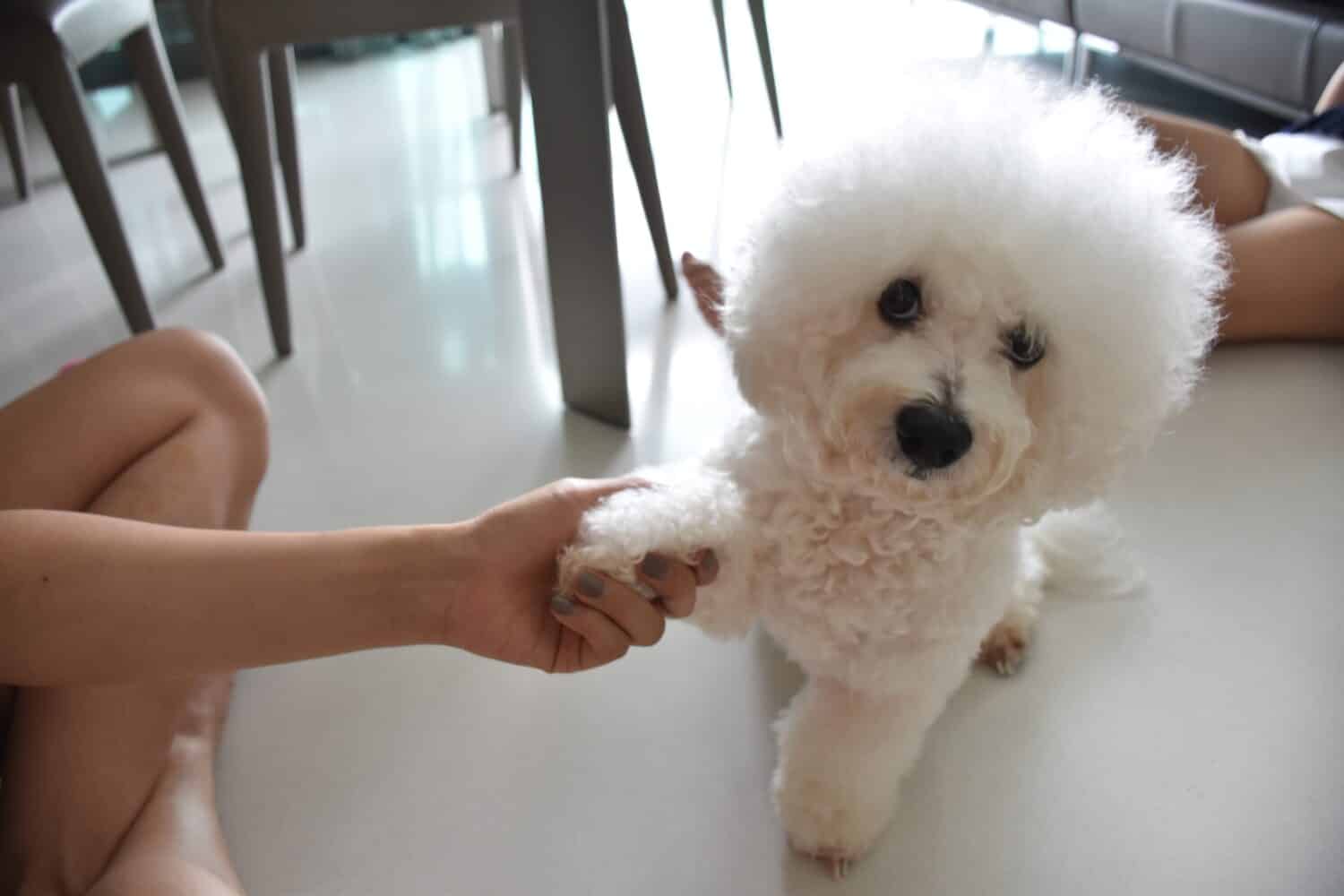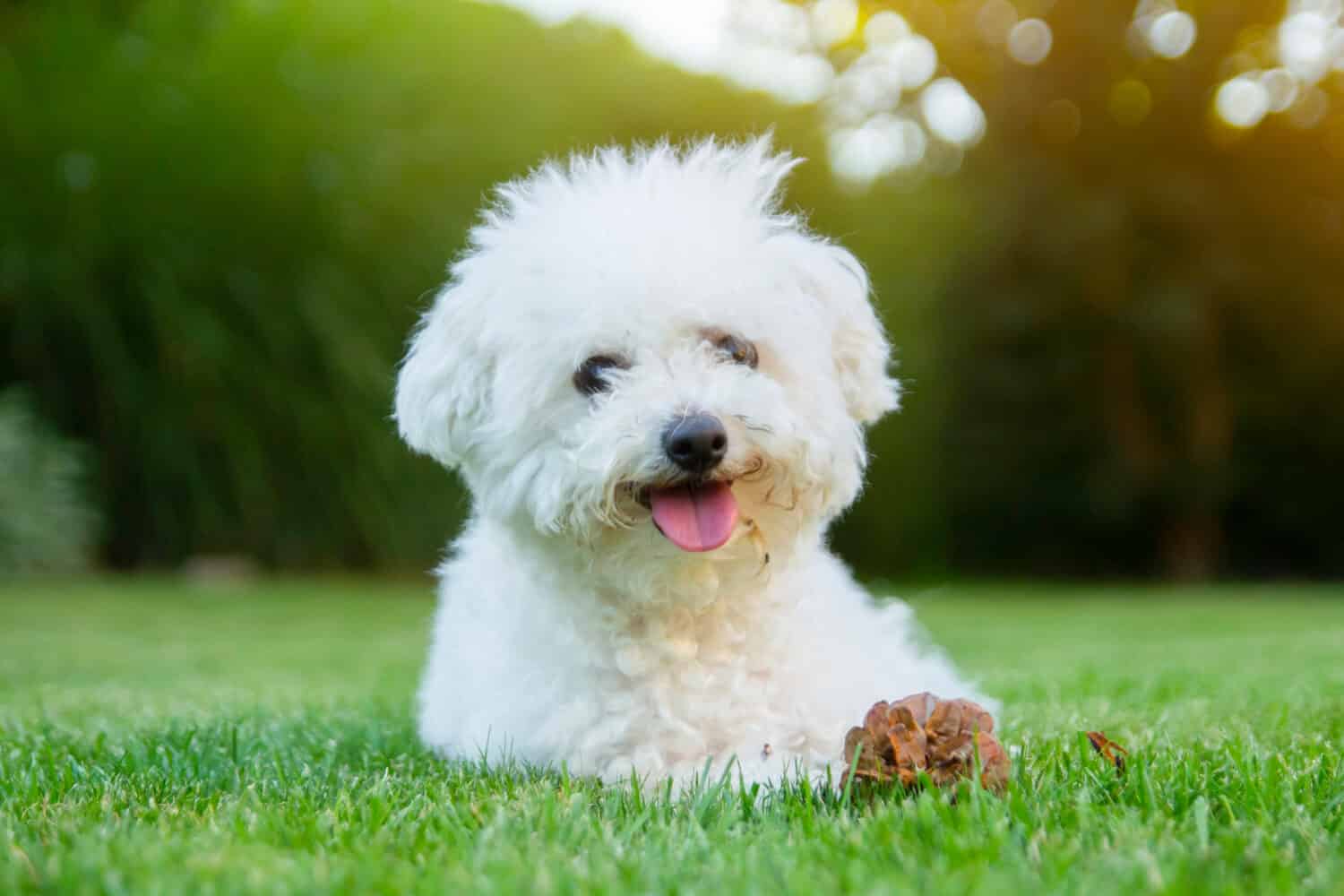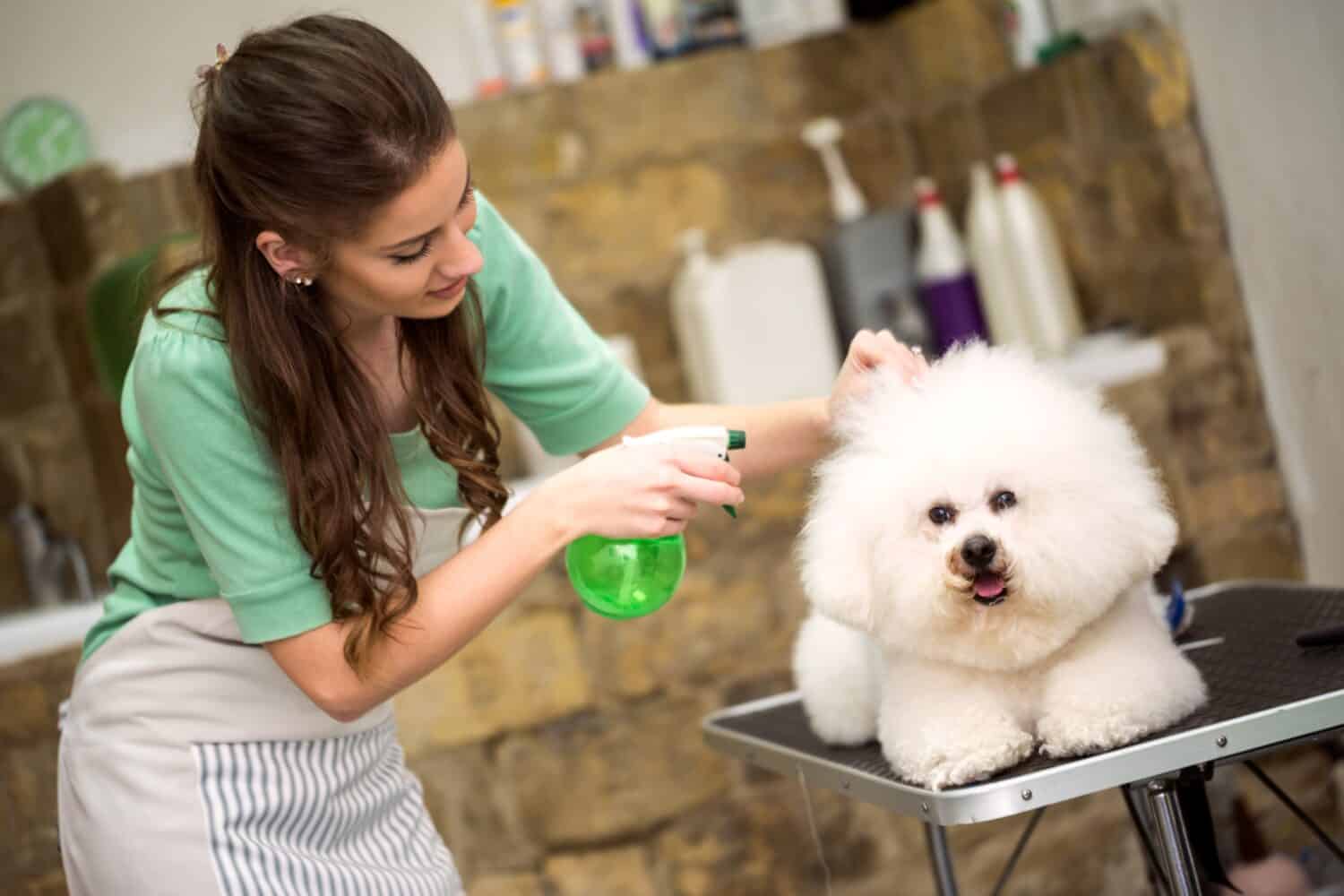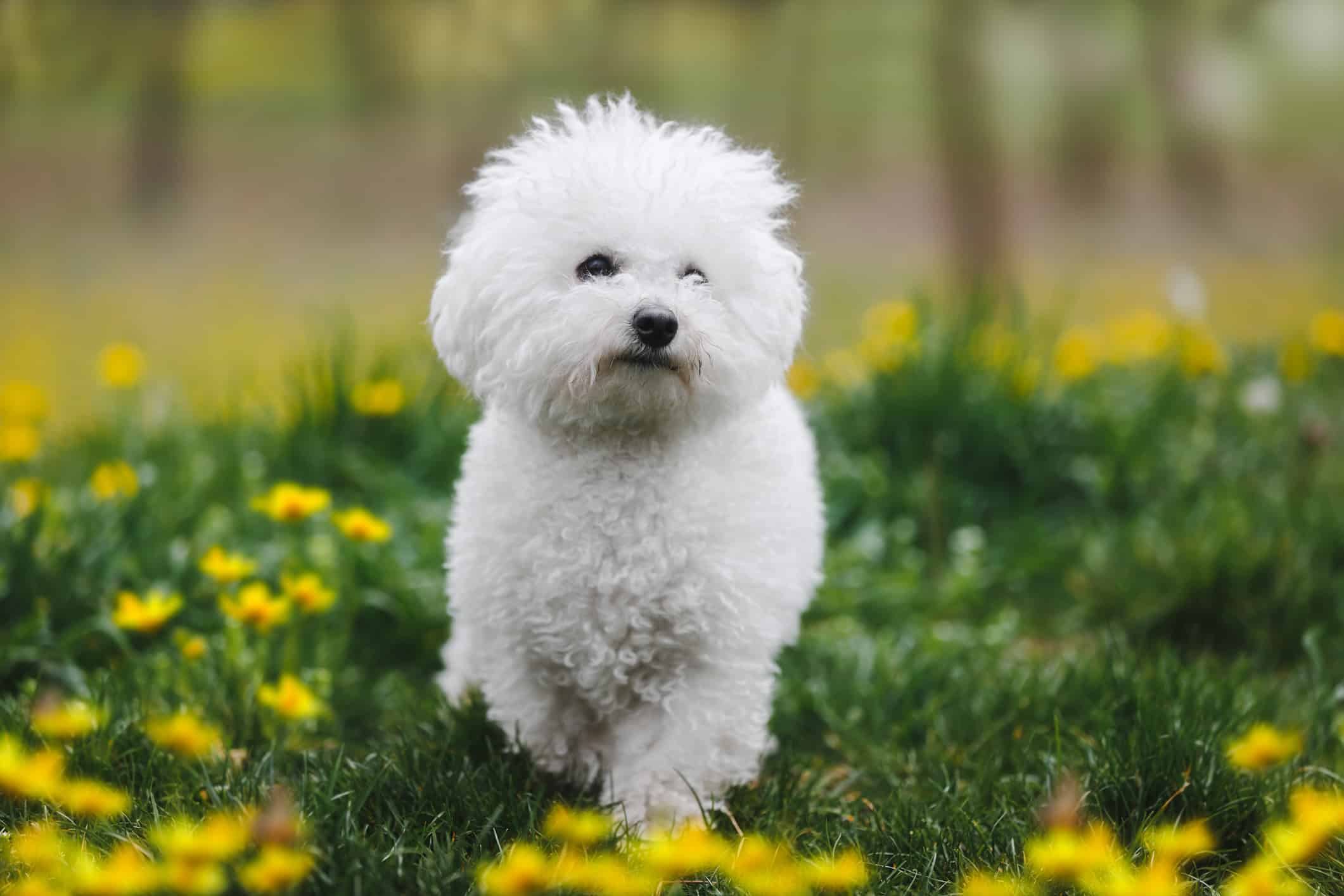Bichon Frises are plush pups that are just as soft and velvety to the touch as they look. They welcome your affection, too, basking in your praise. Confident and playful, bichon frise dogs have developed an impressive reputation both as loving companions and as winners in various competitions. But are they good with kids? Let’s find out!
Bichon Frise: A Bit About This Pooch
The bichon frise is a relatively small dog that weighs anywhere between 12 and 18 pounds. Their height ranges between 9.5 and 11.5 inches. These delightful dogs have a life expectancy of 14 to 15 years. According to the American Kennel Club, this pup has a loving, affectionate personality and gets along well with other dogs. Their shedding is minimal, which helps in homes with kiddos because they don’t add too much to the mess.
They do require daily grooming to keep their curly, double coat healthy. This is also not a reserved pup by any means. Even around strangers, the bichon frise remains open and affectionate. These dogs are flexible and adjust to shifts in schedules without fuss. They play almost nonstop. Since they’re generally eager to please, they’re pretty easy to train but be prepared for high energy because this dog is anything but a couch potato.

©Hyeyeon Ko/Shutterstock.com
Bichon Frise Temperament
Whereas some dogs can just flop onto the couch and mind their own business throughout the day, others need to be focused and working. The bichon frise falls somewhere in between these two extremes. They do need some regular mental stimulation to keep healthy and thriving. You’ll be happy to know that this dog has gained popularity because of its fantastic personality.
Their appearance alone will charm you but once you get to know the personality of the bichon frise, you realize that they’re not just beautiful, they’re also quite intelligent. Because of their adaptability, they make great companions, even when the home gets chaotic. They remain ever curious, staying alert much like a watchdog. However, this dog does not want to put up a fight. It’s open and friendly even with first-time guests!
Despite being on the smaller side, these dogs walk with confidence. If you live in a city environment, this works perfectly with a bichon frise. Training them is generally a breeze as they are eager to perform for you. They have an effervescent personality that attracts even those who generally don’t pay mind to canine companions.
Bichon Frise Social and Exercise Needs
The bichon frise is not ultra-demanding when it comes to its exercise needs. However, daily walks and play sessions are a requirement to keep this pooch in good health. You’ll notice that a bichon frise can lounge around the home for extended periods, but these moments are interspersed with sudden bursts of energy.

©Carlos Amarillo/Shutterstock.com
This pup enjoys playtime and daily walks and may just run around the house when excited to burn off that extra energy. If you have a fenced-in yard, this is wonderful because it allows your bichon frise to get some fresh air and exercise in a safe environment. These dogs are darters, so you want to be cautious and prevent them from being able to make a quick escape.
Bichon frises can be quite vocal, particularly when they want your attention. They thrive in environments where at least one person is present throughout the day. They enjoy being around other people and other dogs, especially when they’re introduced at a young age. They are known to develop social anxiety, which means that it’s not a good idea to bring this dog into a home that’ll be empty most of the time.
Are Bichon Frise Good With Kids?
The bichon frise is a great dog to have in homes with kids. They’re playful, affectionate, and make friends easily with other pups in the home. Although they’re playful, they’re not rough about it. Quite the opposite, actually — they’re graceful and gentle. They appreciate affection, which means your kids can have a snuggly buddy when they’re enjoying time in the living room, nestled into the couch.
What to Consider Before Bringing a Bichon Frise Home
Bichon frises are no different than other dogs when it comes to socialization. This needs to occur early on so that they can thrive and show the best of their personalities. A puppy training class is a good idea because, despite all of the wonderful attributes of the bichon frise, they are notoriously challenging when it comes to housebreaking. Below are some other things to consider before you commit to giving a bichon frise a forever home:
Grooming Needs
Bichon frises are a bit on the high-maintenance side when it comes to grooming. Their coats are extra fluffy, and they look like a big cotton ball. But to remain puffed up like that, they need regular brushing. They have long, double coats that can tangle and mat if they are not consistently brushed. They also require baths once a month. A trim keeps their fur looking healthy and makes it more manageable. Grooming your bichon frise can be a family activity with each age-appropriate kiddo responsible for a certain task. Or you can outsource your pup’s grooming to a professional!

©Lucky Business/Shutterstock.com
Positive Reinforcement is a Must
The bichon frise is eager to please and relatively easy to train but you have to offer positive reinforcement. This is what this dog responds to best. Without positive reinforcement and consistency (along with some of that parent patience you’ve acquired), your bichon frise will display a different side of its personality: stubbornness. If you struggle with training your bichon frise, make sure to have a backup plan. A professional dog trainer can work with your pup to get them trained so that you don’t have to worry about that initial phase.
Susceptibility to Certain Health Conditions
On average, bichon frises have life spans of up to 15 years but during their life, they may develop certain health conditions. Some of the conditions that bichon frises are most susceptible to include dental issues, skin allergies, and bladder stones. However, you can be proactive and keep up to date with your veterinary appointments to detect any problems early on and provide the best treatment.
Nutritional Needs
Have a plan for the type of nutrient-dense diet you are going to provide your bichon frise when you bring it home. These dogs need a diet that is both rich in protein and packed with nutrients. Additionally, you want to make sure that you pick an option that is specially formulated for small dogs so that your new furry member of the family doesn’t overeat and gain excess weight. These small pups are prone to obesity.
Pet Insurance
This is a great choice for any pet, and since bichon frises are susceptible to certain health issues, it’s important to consider pet insurance early on. Unfortunately, when there is already a pre-existing condition, pet insurance won’t cover the cost of care. Do a little shopping around for pet insurance policies and consider one that includes dental work. Since bichon frises are prone to dental issues, this could save you a significant amount of money down the road.
The image featured at the top of this post is ©iStock.com/SStajic.
